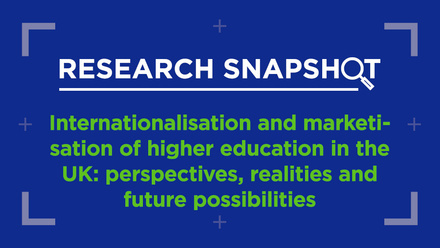Alternative approaches to crisis-time student recruitment

What are students thinking amid the COVID-19 crisis, and how can institutions adjust their recruitment strategies accordingly? In a recent EAIE Community Moment webcast, we sat down with Edwin van Rest of Studyportals to discuss the challenges facing student recruitment for the 2020–2021 academic year and how to overcome them.
International student recruitment is one of the many aspects of international education that have been complicated by the emergence of COVID-19 in early 2020. As a result, recruitment for the coming academic year will be anything but ‘business as usual’, which has injected significant urgency into the discussion about how best to prepare and respond to a host of challenging scenarios.
Smart solutions for student recruitment
Studyportals – an online, global study-choice platform for higher education – has recently conducted research on student perceptions of the COVID-19 crisis and its impact on their future plans. In our recent EAIE Community Moment webcast, we invited CEO and co-founder Edwin van Rest to share some insights and recommendations.
With nearly half of would-be international students having second thoughts about the coming academic year, what are the alternatives?
“In many areas I've seen more progress in two months than we ever deemed possible in 10 years in the world of universities,” Edwin pointed out in praising our sector's response to the crisis so far. He went on to discuss students’ perceptions of the crisis, highlighting that 41% of students report that they will now change their study plans due to the outbreak.
With nearly half of would-be international students having second thoughts about the coming academic year, what are the alternatives? One option students are considering is postponing their studies: many students still intend to study abroad, possibly even in the same country, but will delay the start of their mobility. Another option is starting programmes online – but Edwin emphasised the crucial distinction between students open to starting their mobility experience online versus those who are considering an entirely virtual mode of delivery: the ‘fully online student’ is typically an adult learner and has completely different needs and characteristics.
Encouragingly, Studyportals’ data suggests that the least popular option currently being considered by students is to simply cancel their study abroad plans entirely, implying that the market for international education is still highly resilient.
Institutional perspectives
During our Community Moment, those in attendance were asked to answer several poll questions, which yielded interesting results.
When asked about their expectations for the coming year, a full 77% of audience members responded that they expected international student enrolment numbers to be ‘somewhat lower’ or ‘significantly lower’ than in 2019, and another 11% was not sure what to expect for the coming year. Clearly, we are entering uncharted territory.
Tracking results and optimising conversion rates in the prospective student journey are key components to master
Polling also revealed that 83% of the international education professionals who attended expect international student numbers to decrease in 2020. Their opinions were based on two main concerns: that borders will still be closed at the beginning of the semester, and that visa offices will not be able to process all the applications.
However, there were also other signals: audience members expected a positive rebound in 2021, and also predicted and a massive shift to online resources, from digital recruitment to online virtual events, counseling and communication tools. For universities to be successful in the digital world, tracking of results and optimisation of the conversion rates in their prospective student journey are the key components to master.
Looking forward
Student recruitment will be anything but predictable as we move towards the new academic year, but all hope is not lost. By remaining attuned to how students are experiencing the pandemic and how it is affecting their future plans, higher education institutions will be better positioned to adjust to these short-term and potential longer-term changes in the market.






